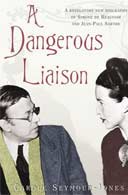A Dangerous Liaison
by Carole Seymour-Jones
Century £20, pp320
It was Dostoevsky who first espoused the notion that if God is dead, everything is permissible. It became one of the founding tenets of existentialist philosophy, but until reading Carole Seymour-Jones's excellent new biography of Jean-Paul Sartre and Simone de Beauvoir, I hadn't quite realised the diabolic glee with which this pair applied the belief to their daily lives.
Having got the business of God out of the way with precocious ease before they hit puberty (for de Beauvoir, He 'ceased to exist' at secondary school; for Sartre, God 'vanished without explanation' when he was 12), they launched themselves into a vortex of depravity with all the alacrity of teenagers breaking a parental curfew.
Seymour-Jones's narrative crackles and pops with engrossing anecdotes. De Beauvoir, the radical, pre-feminist author of The Second Sex, used to get so inebriated she would throw up on the Paris Métro. Sartre once woke up in the gutter after passing out on the street alongside his mistress.
Neither of them was particularly bothered with personal hygiene: when Sartre was a German prisoner of war, his fellow inmates poured insecticide over his lice-infested mattress as he slept, while contemporaries of de Beauvoir recall her strong body odour, trailing from her clothes like a thick intellectual mist.
De Beauvoir and Sartre lived their lives according to the existentialist belief of man's capacity to transcend the limitations of his being. They met in 1929, when they were both studying for the aggregation in philosophy. At 21, she was the youngest person ever to pass, although she had to content herself with coming second to Sartre, a feeling that persisted, says Seymour-Jones, for the rest of her life.
For five decades, they pursued an open partnership that allowed them to engage in 'contingent' relationships with others. It was their radical answer to the outworn convention of marriage: in achieving total transparency with each other, they hoped to experience the true freedom of essential love. 'To have such freedom, we had to suppress or overcome any possessiveness, any tendency to be jealous,' said Sartre. 'In other words, passion. To be free, you cannot be passionate.'
They hoped to devise new ways of living in a godless world, unrestricted by detested bourgeois institutions. But, in reality, Seymour-Jones demonstrates that their quest became a darker, more collusive joint enterprise through the 51 years of their partnership, with deeply unpleasant consequences for those who found themselves towed under by the viscous currents of the Sartrean 'family'.
De Beauvoir became a glorified procuress, exploiting her profession as a teacher to seduce impressionable female pupils and then passing them on to Sartre, who had a taste for virgins. One of them, Olga Kosakiewicz, was so unbalanced by the experience that she started to self-harm. In 1938, the 30-year-old de Beauvoir seduced her student Bianca Bienenfeld. A few months later, Sartre slept with the 16-year-old Bianca in a hotel room, telling her that the chambermaid would be surprised as he had already taken another girl's virginity the same day.
Viewed in this context, the book's title, which refers to the sexual power play between the Marquise de Merteuil and Vicomte de Valmont in de Laclos's Les Liaisons Dangereuses, makes perfect sense. In his journal, Jean Cocteau compares the Sartrean bohemian clique to 'dogs who gnaw at bones, who take turns to piss on the same lamp post, who bite and sniff one another's bottoms'.
A Dangerous Liaison is a tautly written, riveting book. As a dual biography of two of the 20th century's most towering philosophical minds, it elucidates the interplay between their intellectual thought and their personal interactions. Much of Seymour-Jones's work centres on the poisonous frictions between the two. Yet it also works as an impressive analysis of their twin philosophies. It does all this with a lightly worn eloquence, the density of an occasional abstraction made palatable with a peppering of intimate detail.
Sartre's seemingly illogical devotion to the Soviet Union in later life is thus viewed through the prism of his passionate affair with Lena Zonina, who was almost certainly a KGB agent. His love of communism was also a replacement for Christianity. However hard Sartre tried to reconcile his devotion to individual freedom with the cyclical view of history perpetrated by Marxism, he never quite convinced his critics, among them Albert Camus. Sartre's protestation that we should 'judge communism by its intentions and not by its actions' seemed grotesque in the face of between 15 and 30 million deaths in the gulag.
But it is in her depiction of de Beauvoir that Seymour-Jones really hits her stride. Although de Beauvoir believed that her relationship with Sartre was 'the one undoubted success of my life', Seymour-Jones gently scratches at the varnish of this statement until it flakes off like gilt from an icon. The appearance of unity was only achieved at the cost of de Beauvoir's emotional unravelling.
As a philosopher, de Beauvoir felt at one with Sartre. As a woman, she was left tormented by jealousy and the perpetual fear that Sartre would leave her for a younger, more nubile partner. The couple's sexual relations were more or less over after the war, and it was the short, bespectacled Sartre who enjoyed a string of ardent affairs. When de Beauvoir, aged 39, experienced 'the most passionate relationship of her life' with American novelist Nelson Algren, she ultimately denied herself, insisting: 'I could not desert Sartre and writing and France.'
In her life, de Beauvoir sought to overcome the socially imposed limitations of her womanhood. It was, says Seymour-Jones, a heroic attempt to break 'the mould of their century'. But perhaps the most poignant conclusion to be drawn from this formidable biography is that de Beauvoir never quite managed to free herself of what it meant to be a woman in love.
